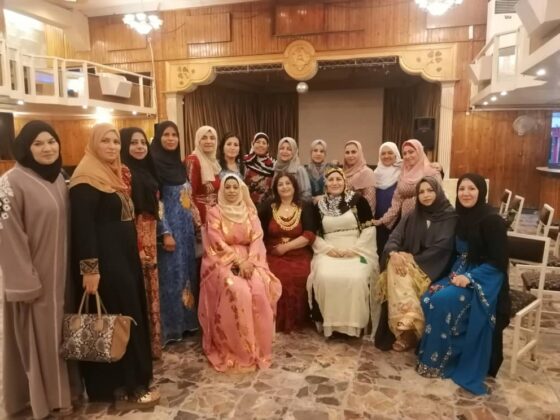By Arya Haji
A shared passion for humanitarian work brought together a group of women in Northeast Syria, inspiring them to create a space where women from various Syrian regions could achieve economic independence and establish small businesses. This space, aptly named “Small Dreams,” began as a modest initiative but has grown steadily, turning once-small aspirations into tangible successes.
Fatima Khalil, a woman in her forties from Qamishli and of Mhalmi descent (an Arab tribe in Syria’s Jazira region), has been knitting wool since childhood. More than just a craft, she has shared her skills with many in her neighborhood, helping women acquire raw materials and sell their handmade products.
A local organization recognized Fatima’s efforts and provided her with a platform to work. There, she met other like-minded women, including Siham Ahmed, with whom she forged a strong friendship. As they honed their handicraft skills, the women saw the potential of working collectively. They formed a group named “Small Dreams,” their first milestone was preparing for an exhibition to showcase their creations.
The initiative started with around 15 women and has grown to over 70. Despite the region’s economic hardships, they have persevered, supporting one another in their journey toward financial stability.
A Journey of Cultural Exchange and Economic Independence
Siham Ahmed, a Kurdish woman in her forties from Qamishli, has been engaged in humanitarian work for nearly 15 years. Her journey began with aiding displaced families fleeing war-torn areas of Syria to the northeast, helping provide essential supplies. She also spent over eight years volunteering with local civil society organizations and charities.
“At one of the organizations, I worked in women’s committees focusing on combating violence against women. That’s where I met Fatima,” Siham recalls. “We had long discussions about how to provide sustainable support for women, especially survivors of violence.”
Fatima and Siham began visiting women in need, offering psychological support and providing raw materials to those skilled in handicrafts. As their network expanded, “Small Dreams” grew organically.
“We complemented each other’s efforts and launched several initiatives—many of which continue today. We distribute school supplies at the start of each academic year, buy Eid clothes for orphaned children, and fund these efforts through local donations. We realize the power of community solidarity each time,” Fatima explains.
Launched in 2020, “Small Dreams” became a haven for Syrian women, providing them with economic opportunities and a space to connect with diverse cultures. The group included women of different ethnic and religious affiliations and women from different Syrian cities, including Damascus, Kobani, Raqqa, Homs, Idlib, and others, fostering an environment of shared learning and skill development.
Beyond their personal growth, the women have also spearheaded social initiatives—raising funds for heating fuel, home repairs, free haircuts for orphaned children, and medical assistance for those in financial distress.
Women of the “Small Dreams” Group
Redefining Community Support
Rabiha Hammadi, another woman in her forties, was displaced from Deir ez-Zor to Qamishli in 2016. Skilled in knitting and making homemade preserves, she joined the same local organization where Fatima and Siham worked and played a crucial role in founding “Small Dreams.”
Rabiha admits she initially faced apprehensions about moving to Qamishli due to stereotypes suggesting a strained relationship between the communities of Hasakah and Deir ez-Zor. However, her experiences quickly dispelled these misconceptions as she built strong friendships and a deep sense of belonging.
“Being part of ‘Small Dreams’ never made me feel like an outsider. I’ve always felt surrounded by family, and this unity has even extended to our children,” says Rabiha.
Her biggest hope is that the initiative will receive enough support to sustain and expand its projects, allowing more women to start their own businesses. She emphasizes that the group operates purely on the belief in women’s potential, free from any ethnic or sectarian discrimination.
“Through this group, I’ve also learned about the various Syrian dialects,” Rabiha adds.
Meanwhile, Fatima dreams of one-day hosting exhibitions funded entirely by her earnings to help women showcase and sell their work. Despite the challenges, she is grateful for the unwavering support of her family, particularly her husband, who encourages her to pursue her ambitions of empowering women in Syrian society.
“We are now welcoming young women into the group because we believe the younger generation is the key to real change. Our communities need them to revive the economy and other aspects of life,” says Siham. She adds that the joyful moments of preparing for an exhibition or launching an initiative keep them motivated despite the obstacles.
According to Siham, the group has profoundly impacted women’s self-reliance, confidence, and financial independence while easing psychological and social burdens. She notes that lives have been transformed, and strong community bonds have been built—bonds capable of withstanding any crisis. With the support of her family and husband, Siham remains committed to leading “Small Dreams” toward a future where every woman in the group sees her aspirations fulfilled.

